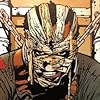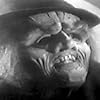Niklas Pivic
asked:
How can we take this book seriously following this scathing critique? https://www.theguardian.com/books/2016/nov/16/blitzed-drugs-in-nazi-germany-by-norman-ohler-review
To answer questions about
Blitzed: Drugs in Nazi Germany,
please sign up.
Keith Martin
Because the review is crappy. Hugh Trevor Roper wrote about Hitler's drug abuse in 1947. The author specifically states that drugs were not excuses for Hitler's murdering of Jews or Russians yet this review implies otherwise.
It's a crappy review. Read the book and see for yourself.
It's a crappy review. Read the book and see for yourself.
Bill Palmer
There are a couple of valid points in the Evans review. I, too, was confused by Ohler's seemingly contradictory assertions, on the one hand, that Hitler retained competent decision making abilities throughout the war, and on the other, that he was completely detached from and indeed willfully sought escape from reality. Regardless of what any of us may say, the two things are inconsistent. And Ohler not only probably overstates his case, but he does do so in sort of a conveniently vague way at certain points. Nevertheless, a scenario in the ballpark of that which Ohler suggests isn't terribly difficult to imagine. Even today we see countless numbers of people becoming addicted, particularly to opioids, on the basis of the presumed validity of a doctor's having prescribed them - "so they must be okay, right?". Mightn't we all simply settle upon a conclusion that the powerful drugs outlined in "Blitzed" probably played a more prominent role in WWII Germany than has generally been recognized?
Melissa
Agreed with Keith Martin - that review represents a gross misreading of the book.
Matthew Anderson
Because Ian Kershaw has spoken very highly of it.
Alisha
I would consider this a vastly better review.......http://www.nybooks.com/articles/2017/...
Doug Irvine
Hitler did not kill people because he did drugs. Hitler did drugs because he thought they would enable him to kill even more people. This strategy did not pay off as it left him a raving junkie, who became so unstable that he blew up his own nut bar empire. If drugs did not save the world they at least saved millions of lives by shorting the war. So in closing yeah drugs, drugs good and boo hiss to blood thirsty monsters who think they make the world a better place if they can just kill enough people.
Clemfandango
Because it's The Graun? Well known for partisan politically motivated opining. Agenda first, facts second.
Ohler is very clear that Hitler's drug abuse does not ameliorate personal responsibility. I don't even believe in the dilution of responsibility: it is Morell who is the human focus of the book, standing (in lieu of a full bio) as a placeholder for all the bunker yes-men. Hitler was 100% responsible, and so were a lot of others.
We hanged a lot of Nazis. Europe was fortunate to have in the allies a civilization with clear ideas of justice. It would not happen today.
Ohler is very clear that Hitler's drug abuse does not ameliorate personal responsibility. I don't even believe in the dilution of responsibility: it is Morell who is the human focus of the book, standing (in lieu of a full bio) as a placeholder for all the bunker yes-men. Hitler was 100% responsible, and so were a lot of others.
We hanged a lot of Nazis. Europe was fortunate to have in the allies a civilization with clear ideas of justice. It would not happen today.
Koenraad Dumoulin
A lot of new historical books on WW1 as well WW2 are paste and copy books. After reading many many books on both wars I must say that this book " Blitzed " was a revelation, brought things in perspective. It is a must read by all that are studying WW2. It reveals the use of drugs to overcome fatigue and hunger by fighting troops ( as an offensive can not go on for more thenn 5 to 8 days ). On the other hand the book shows that also leading figures of the III Reich, and not less the Führer himself, were using drugs to overcome their stress and fatigue, not the less supporting them in their criminal mindset to winn the war and give full outcome to their dictatorial regime. After reading the book a lot will come clearer: the rapid physical decline of the figure of AH, his mental (criminal dictarorial) mindset till the end when those ordered to appear in HQ were afraid to do so. The drugs had an influence, but as a supportive role, and not really affecting as much as addiction or influencing the mindset. This book is really a "must read" and you will understand what I mean. It is a good " illuminating " book with a rarely seen new subject.
Tracey
"His numbness, his rigid view of the world, his tendency toward the fantastical, and the unscrupulous transgression of all boundaries - all of this was ominously supported by the opiod that he used so frequently in the last quarter of 1944. During this time, when the Allies were entering the Reich from both east and west, the powerful narcotic erased any doubts about victory, any empathy for civilian victims, and made Hitler even more unfeeling about both himself and the outside world. On this tranquilizing painkiller, the Fuehrer was fully in command of himself. This was the true Hitler, and that was how he had always been. The overestimation of his own significance and misjudgment of his opponents were both captured in his blueprint Mein Kampf, published in 1925. His opiod addiction only cemented an already existing rigidification, a tendency to delegate violence, and contributed to the fact that in the last phase of the war and in the genocide of the Jews, he never once thought of relenting. So the goals and motives, the ideological fantasy world, were not the result of drugs, but established much earlier. Hitler did not murder because he was living in a haze - quite the contrary: he remained sane until the end. His drug use did not impinge on his freedom to make decisions. Hitler was always the master of his senses, and he knew exactly what he was doing. He acted always in an alert and cold-blooded way. Within his system, based from the beginning on intoxication and the flight from reality, he acted systematically and with terrible consistency to the end. He was anything but insane. A classic case of Actio libera in causa, he could go on taking as many drugs as he liked to keep himself in a state in which he could commit his crimes. It does not diminish his monstrous guilt. "
Susan Paxton
I have a great deal of respect for Evans, but he has a number of blind spots. For example, he hates - and I think that's the correct word - Timothy Snyder and has excoriated his books in reviews. I think the same thing is happening here.
Jesse Wemyss
This was brilliantly composed with endlessly valuable research behind everything
Andy
PG 185-186: "So the goals and motives, the ideological fantasy world, were not the result of drugs but established much earlier. Hitler did not murder because he was living in a haze - quite the contrary: he remained sane until the end. His drug use did not impinge on his freedom to make decisions. Hitler was always the master of his senses, and he knew exactly what he was doing. He acted always in an alert and cold-blooded way. Within his system, based from the beginning on intoxication and a flight form reality, he acted systematically and with terrible consistency to the end. He was anything but insane. A classic case of actio libera in causa: he could go on taking as many drugs as he liked to keep himself in a state in which he could commit his crimes. It does not diminish his monstrous guilt."
C. G. Telcontar
No it cannot be taken as anything but an attempt at rehabilitation of Hitler by pointing fingers in other directions. If you make him out to be a helpless junkie, you take away his responsibility, at least to some degree. Thing is, Ohler is a revisionist and comes close to outright lying. It's greatly entertaining, in a sarcastic way, but in no way is it history. It ought to come with a warning label. It's difficult to consider it nonfiction.
About Goodreads Q&A
Ask and answer questions about books!
You can pose questions to the Goodreads community with Reader Q&A, or ask your favorite author a question with Ask the Author.
See Featured Authors Answering Questions
Learn more














